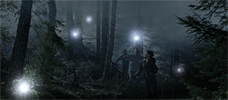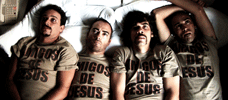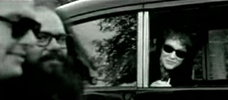Reviews
Amigos de Jesús
Antonio Muñoz de Mesa
Spain, 2007
Credits
Review by Tom Huddleston
Posted on 15 October 2007
Source 35mm print
Categories The Times BFI 51st London Film Festival
In a year stuffed with comedies exploring the diversity of masculine relationships and male bonding (most of them starring either Will Ferrell or Seth Rogen), one of the most surprising and enjoyable is this debut feature from Spanish writer-director Antonio Munoz de Mesa. Shot on the fly and on a microbudget, the film makes the most of an intriguing setup, a witty script and some likeable central performances.
From the very beginning, de Mesa plays around with the form, turning budgetary disadvantages to his favour. Acknowledging that footage shot on cheap digital cameras tends to look like documentary, he utilises to-camera interviews and on-the-spot talking head footage to enhance the film’s fictional storyline. We open with a series of such interviews, as the four titular Amigos introduce themselves. Jesus (played by de Mesa) is a moustachioed lothario in an unnamed Spanish city, the unquestioned head of his social clique, which also includes disciples Mateo, Lucas and Juan (Matthew, Luke and John), each of whom believe themselves to be Jesus’ closest friend and confidante. So when Jesus’ heart is apparently broken by scheming ex-girlfriend Paula, the three band together and book a trip to New York, hoping to take Jesus’ mind off the pain.
The writer- director’s ambiguous feelings towards his creations are made explicit almost from the start. Jesus, particularly, is quickly revealed as something of a monster: it isn’t Paula’s rejection that has upset him, rather the fact that she got there first. He even plans to win her back, sleep with her best friend (again), and then dump her purely as revenge. The others, meanwhile, are clearly morally skewed - Mateo has slept with Paula, but insists he isn’t the reason she left Jesus - but it’s initially unclear how much of this is genuine rottenness, and how much is due to their own insecurity and the malign influence of their peers.
Things fall apart very quickly, as Mateo’s treachery is revealed. The film is separated into ten ‘chapters,’ each with its own progressively more hysterical heading: from ‘what to do when your friend gets rejected,’ to ‘what to do when your friend is an asshole,’ to the final (and wonderfully appropriate) ‘what to do when your friend is slower than your car.’ These are interspersed with interviews, both with the central players, with their girlfriends back in Spain, and with the general public—one wonderful sequence consists of a number of face-to-face interviews shot in Central Park, asking average Americans to define the meaning of friendship: their answers range from the predictably sweet, to the vaguely sad, to the deeply bizarre.
But mostly the film focuses on its four protagonists, locked into their own little world of self pity and recrimination. Even when the party moves to Las Vegas in the final act (for reasons too ludicrous to recount here) the film never becomes a Borat-style road movie: these characters are far too wrapped up in themselves to pay attention to anyone outside the circle. A scene in which all four men get laid focuses entirely on their four faces, all we see of the women are their feet: Juan and Lucas, in particular, seem far more physically interested in one another than their unseen conquests.
Friends Of Jesus will be, for some, a problematic film—any film which spends so much time depicting and discussing bad behaviour can’t help but edge towards being a celebration of such behaviour, a fact some viewers will find distasteful. The director is as obsessed with his characters as they are with themselves, and when the female characters finally make their brief appearance and are revealed as shallow, confused and rather stupid, the film threatens to shift from a critique of masculinity to a work of blanket nihilism. But a high level of energy in the filmmaking and the acting, coupled with the humour and undoubted intelligence in the script carry it through. And although we are encouraged to despise and even pity these characters, somehow they manage to remain likeable.
In the final stages Friends of Jesus begins to achieve some kind of depth, as we learn what the three disciples would have been like if they had never met and fallen for their mentor Jesus—successful, happy and self confident. As an exploration of how male relationships destroy one another, it’s an extraordinary and surprisingly insightful moment. And the climax, too, is powerful, as the disciples confront Jesus in the desert, finding the strength to abandon him and become their own men.
But it’s hard to see Friends Of Jesus getting an American release for one very simple, and decidedly dubious reason: in the middle of the film, the four characters are about to catch their plane to Las Vegas when a catastrophe occurs, closing all the airports and leaving them stranded in New York. This catastrophe is never shown, all we’re told is that it involves planes flying into buildings, but it’s more than enough to turn any American distributor off picking up the film. Perhaps de Mesa could argue that he was making a comment on the characters—all they care about is their own situation, and the tragedy is barely referred too again. But the fact remains that this is a 9/11 joke in rather poor taste, and not even particularly funny. A shame, because a country with such a massive Spanish-speaking population could have made this otherwise very likeable film a decent-sized hit.
More The Times BFI 51st London Film Festival
-

Island of Lost Souls
2007 -

Garage
2007 -

Exodus
2007 -

Friends of Jesus
2007 -

We Want Roses Too
2007 -

The Trap
2006 -

Captain Ahab
2007 -

Shotgun Stories
2007 -

Savage Grace
2007 -

The Assassination of Jesse James by the Coward Robert Ford
2007 -

The World Unseen
2007 -

Things We Lost In The Fire
2007 -

Lions for Lambs
2007 -

Talk to Me
2007 -

Redacted
2007 -

Battle For Haditha
2007 -

Chaotic Ana
2007 -

Angel
2007 -

Juno
2007 -

Fay Grim
2006 -

Reservation Road
2007 -

I’m Not There
2007
We don’t do comments anymore, but you may contact us here or find us on Twitter or Facebook.



